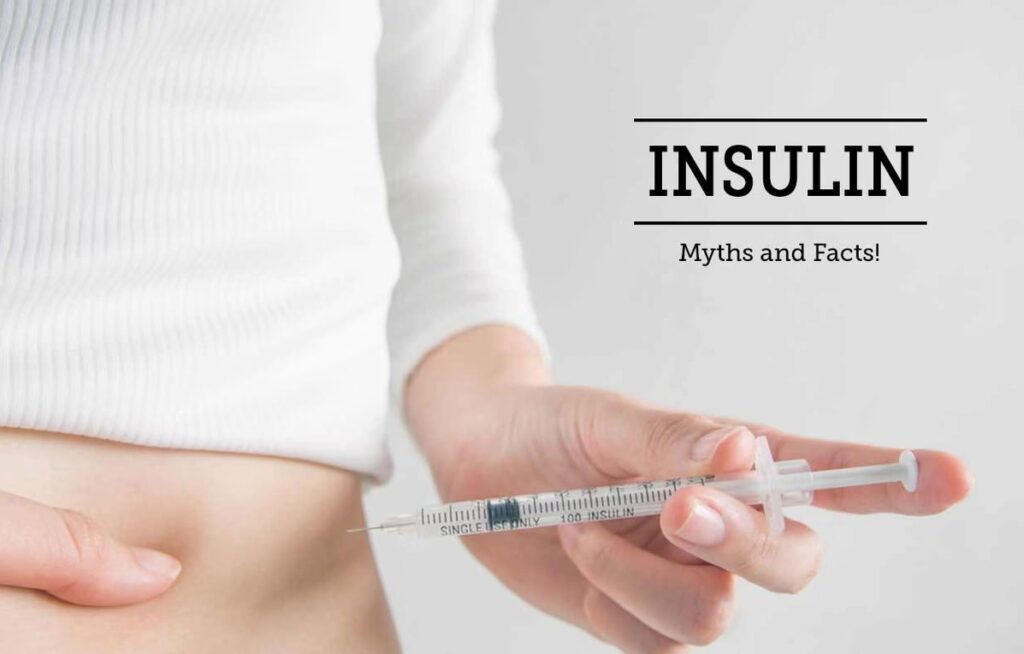For individuals managing diabetes, insulin is a vital hormone that regulates blood sugar levels and is often prescribed as part of treatment. However, despite its life-saving role, insulin is often misunderstood. A number of myths and misconceptions about insulin persist, causing confusion, fear, and, in some cases, resistance to treatment. This article aims to address and debunk common myths about insulin, provide clarity on its role in diabetes management, and offer accurate information to empower individuals living with diabetes.

What is Insulin?
Insulin is a hormone produced by the pancreas that regulates blood sugar (glucose) levels by allowing cells to absorb glucose for energy. Without insulin, glucose stays in the bloodstream, leading to elevated blood sugar levels, which can cause serious health issues over time.
For individuals with Type 1 diabetes, the body’s immune system attacks the insulin-producing beta cells in the pancreas, resulting in a complete lack of insulin production. In contrast, people with Type 2 diabetes may still produce insulin, but their bodies either don’t make enough or become resistant to its effects. In both cases, insulin therapy is often necessary to control blood glucose levels.
Despite the essential role of insulin in managing diabetes, myths about the hormone and its usage abound, often leading to hesitancy and fear around insulin therapy.
Common Myths and Misconceptions About Insulin
Myth 1: “Taking insulin indicates that my diabetes cannot be properly managed.”
The Reality:
This is one of the most common and damaging myths associated with insulin therapy. The truth is, diabetes is a progressive disease, particularly Type 2 diabetes. Over time, the pancreas may lose its ability to produce enough insulin, regardless of how well a person manages their lifestyle, diet, and medications. Insulin therapy is a natural progression in diabetes management and does not signify failure. For people with Type 1 diabetes, insulin is a necessity from the time of diagnosis.
Fact: Insulin is simply a tool that helps manage blood sugar levels effectively. It is not an indication of personal failure or poor management.
Myth 2: “Insulin is addictive.”
The Reality:
Insulin is a naturally occurring hormone in the body, not a substance of addiction. This misconception arises because some individuals may believe that once they start insulin therapy, they become dependent on it in the same way someone might become dependent on a drug. However, insulin is necessary for people with diabetes because their bodies either don’t produce enough or don’t use it effectively.
Fact: Insulin is a critical, life-saving medication for people with diabetes, not something you can become addicted to. Needing insulin is simply part of managing diabetes.
Myth 3: “Insulin causes weight gain.”
The Reality:
While some people do experience modest weight gain when they start insulin therapy, this does not mean insulin is the sole cause. The weight gain may occur as the body adjusts to better blood sugar control, allowing it to store glucose more effectively in cells rather than losing excess glucose through urine.
Fact: Weight gain associated with insulin therapy is generally modest and can be managed through healthy eating, exercise, and regular monitoring. The benefits of improved blood sugar control far outweigh the risks of minor weight gain.
Myth 4: “Insulin can only be taken by those who have Type 1 diabetes..”
The Reality:
Although insulin is critical for managing Type 1 diabetes, many individuals with Type 2 diabetes also require insulin therapy at some point in their treatment. Over time, Type 2 diabetes can progress to the point where oral medications are no longer sufficient to maintain normal blood sugar levels, and insulin becomes necessary.
Fact: Insulin is used for both Type 1 and Type 2 diabetes, depending on individual needs and the progression of the disease.
Myth 5: “Once I start insulin, I can’t stop.”
The Reality:
For many individuals with diabetes, particularly Type 2 diabetes, insulin may not be a permanent therapy. Lifestyle changes, such as improved diet, regular exercise, and weight loss, may allow some people to reduce or even discontinue insulin use over time. However, for others, especially those with Type 1 diabetes, insulin therapy is lifelong and non-negotiable.
Fact: Starting insulin doesn’t necessarily mean you’ll need it forever. However, it’s important to follow your healthcare provider’s advice and continue regular monitoring.
Myth 6: “Injecting insulin is painful.”
The Reality:
Many people fear insulin injections because they assume it will be painful. However, modern insulin needles are extremely thin and designed for minimal discomfort. With proper technique, most people find that insulin injections are either painless or cause only mild discomfort.
Fact: With practice and proper technique, insulin injections can become a simple, routine task with little to no pain.
Myth 7: “Oral medications are always better than insulin.”
The Reality:
Oral medications can be highly effective for many people with Type 2 diabetes, especially in the early stages of the disease. However, as diabetes progresses or if blood sugar levels remain uncontrolled, insulin may be the best and sometimes the only option. Insulin therapy can offer more precise and immediate control of blood sugar levels compared to oral medications.
Fact: Insulin is not a “last resort.” It is a powerful, effective treatment option that can be tailored to an individual’s needs when oral medications are no longer sufficient.
Myth 8: “Taking insulin can sometimes cause Hypoglycemia, or low blood sugar .”
The Reality:
While it’s true that insulin can lower blood sugar levels, the risk of hypoglycemia can be minimized with careful monitoring and proper dosing. People who manage their insulin therapy appropriately and consistently check their blood sugar levels can greatly reduce the likelihood of hypoglycemia.
Fact: Insulin, when used correctly, helps maintain stable blood sugar levels. The risk of low blood sugar can be managed through careful monitoring, diet, and regular consultations with healthcare professionals.
Myth 9: “Insulin will fix my diabetes completely.”
The Reality:
Insulin is essential for managing diabetes, but it’s not a cure. It helps keep blood sugar levels within target ranges but must be used in conjunction with other management strategies, such as healthy eating, regular exercise, and medication as prescribed. For Type 1 diabetes, insulin is a lifelong treatment, and while it helps manage the disease, it doesn’t eliminate the condition.
Fact: Insulin is a treatment, not a cure. Managing diabetes requires a comprehensive approach, including lifestyle modifications, insulin (or other medications), and regular medical check-ups.
Myth 10: “People on insulin cannot lead normal, active lives.”
The Reality:
People with diabetes who use insulin can lead full, active lives, including engaging in exercise, travel, and other normal activities. Insulin therapy doesn’t need to interfere with daily life when managed properly.
Fact: With modern insulin delivery methods like pens and pumps, along with proper blood sugar monitoring, people on insulin can maintain active, normal lifestyles without significant restrictions.
Addressing the Facts: How Insulin Works and Its Role in Diabetes
To truly understand insulin’s role, it’s essential to recognize how it functions within the body. Insulin permits glucose to enter cells so that it can either be stored for future use or consumed as energy. Without enough insulin, glucose builds up in the bloodstream, leading to hyperglycemia (high blood sugar).
For Type 1 diabetes patients, insulin is a necessity from the moment of diagnosis, as their pancreas no longer produces insulin. For Type 2 diabetes patients, insulin is often introduced when the body can no longer manage blood sugar levels with oral medications, lifestyle changes, or other therapies.
It’s critical to keep in mind that managing diabetes requires careful individualization. Insulin, for many, is just one part of a broader diabetes care plan that includes diet, exercise, and other medications.
Frequently Asked Questions (FAQs)
Q1: Will insulin therapy cause weight gain?
While insulin can sometimes cause weight gain, it’s usually modest and can be managed through a balanced diet and regular exercise. The benefits of controlling blood sugar far outweigh the risk of a slight increase in weight.
Q2: Is it possible to stop using insulin after starting?
For individuals with Type 2 diabetes, lifestyle changes, weight loss, and improved insulin sensitivity may allow for reduced insulin use or discontinuation. However, for people with Type 1 diabetes, insulin is a lifelong necessity.
Q3: Can I skip insulin doses if my blood sugar is normal?
Skipping doses is not recommended. Even if your blood sugar levels appear normal, insulin is essential for maintaining those levels. Regular use as prescribed helps prevent future complications.
Q4: Can insulin be administered without injections?
Insulin is typically delivered via injection, but advancements in insulin delivery systems, such as insulin pumps and inhaled insulin, offer alternatives. Discuss with your healthcare provider to find the best method for your needs.
Q5: Can I travel with insulin?
Yes, you can travel with insulin, but you should take precautions such as storing it at the proper temperature and bringing enough supplies for your trip. Airlines and customs officials generally allow insulin and diabetes supplies with proper documentation.
Reference : http://www.apollosugar.com
Disclaimer : This article is only for educational purposes. Kindly consult your doctor before acting on any information provided in the arrticle.







